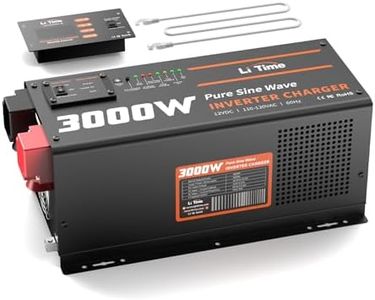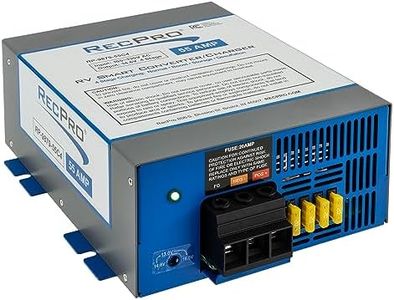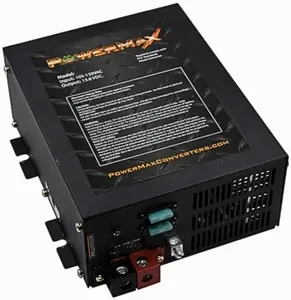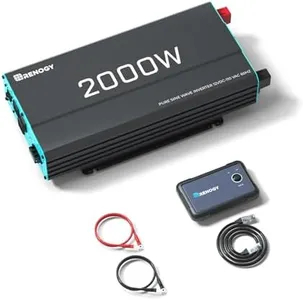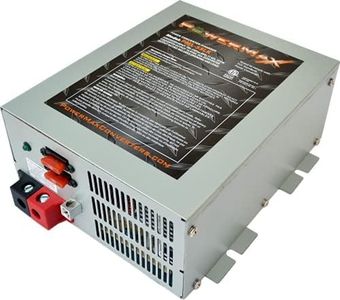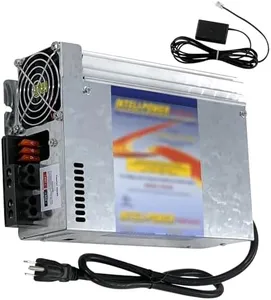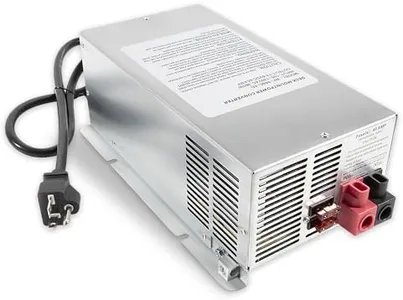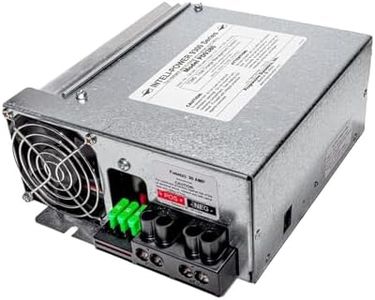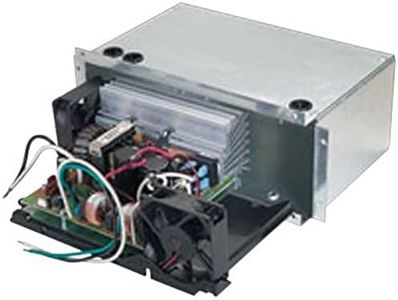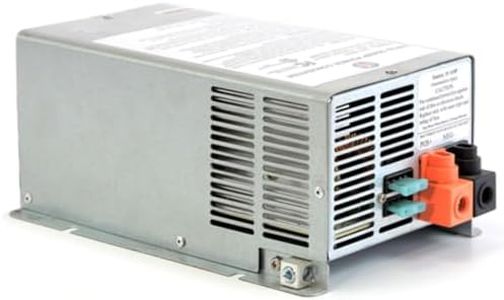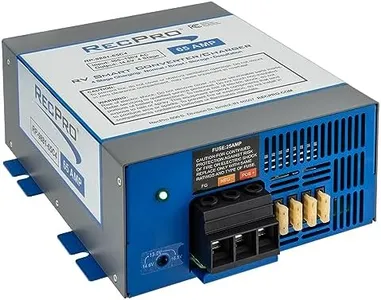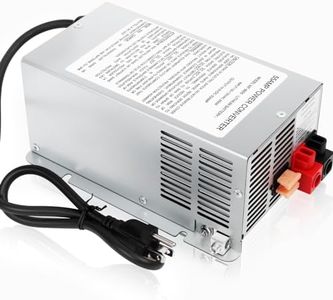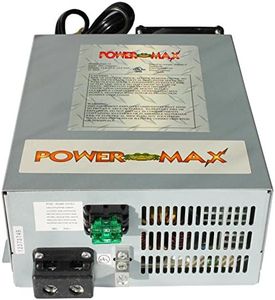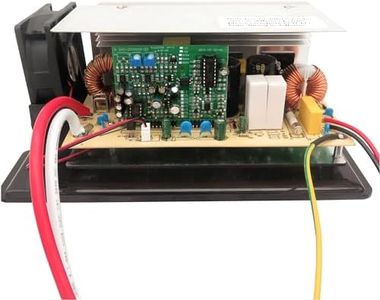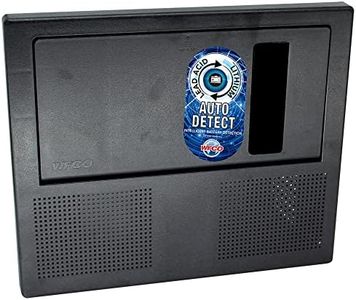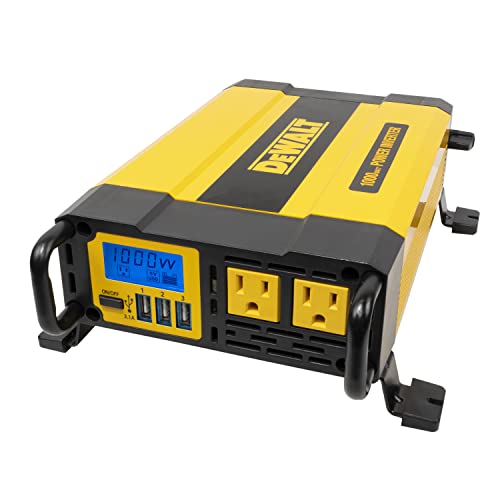10 Best Rv Power Converters 2025 in the United States
Our technology thoroughly searches through the online shopping world, reviewing hundreds of sites. We then process and analyze this information, updating in real-time to bring you the latest top-rated products. This way, you always get the best and most current options available.

Our Top Picks
Winner
RecPro RV Converter 55 Amp | RV Power Converter & Battery Charger | 4 Stage Smart Charging | 120VAC to 12VDC | 13V to 16.5V Operating Range
Most important from
1081 reviews
The RecPro RV Converter 55 Amp is a versatile and efficient power converter designed for RV use. It converts 120VAC shore power into 12VDC power, which is essential for powering low voltage lights and appliances in your RV. One of its notable strengths is the 4 Stage Smart Charging feature, which ensures your RV's battery is charged optimally and safely, whether you're using lead or lithium batteries. With an operating range of 13V to 16.5V, it provides flexibility and reliability in different power conditions.
Available in various capacities, including 35-amp, 45-amp, 55-amp, 60-amp, 75-amp, and 100-amp, you can choose the one that best suits your needs. The 55-amp version weighs 2.85 kilograms and has a compact design with dimensions of 9.5 x 8 x 3 inches, making it easy to fit into your RV's limited space. The built-in charging indicator is a handy feature, allowing you to monitor the charging status easily. The RecPro RV Converter 55 Amp is well-suited for RV owners looking for a reliable and efficient power converter that can handle various battery types and provide consistent power for their vehicle's electrical needs.
Most important from
1081 reviews
Powermax RV Converter | 55 Amp | 12V Power Converter with Built-in 4 Stage Smart Battery Charger | 110Vac to 12Vdc | Lithium Compatible | Fully Adjustable Output from 13V to 16.5V | PM4 55A
Most important from
2394 reviews
The PowerMax RV Converter with a 55 Amp power output and 12V conversion capability is a versatile and practical choice for RV, automotive, and boat applications. One of its biggest strengths is the built-in 4-stage smart battery charger, which helps in efficiently charging and maintaining various types of batteries, including lithium. This feature ensures longer battery life and reliable performance.
Additionally, the converter's fully adjustable output from 13V to 16.5V allows for flexibility in different environmental conditions and needs. Users will appreciate that the installation is straightforward, taking roughly 10 minutes, with no need for rewiring, making it a hassle-free experience. The converter also offers safety features like reverse polarity, overload, and thermal protection, which add to its reliability and ease of use.
However, at 6.4 pounds, it may be slightly heavier than some other models on the market, which might be a consideration for those looking to minimize weight. Nonetheless, the PowerMax PM4 55A remains a robust and adaptable option for anyone in need of a dependable power converter for their RV or other 12V applications.
Most important from
2394 reviews
Renogy 2000W Pure Sine Wave Inverter 12V DC to 120V AC Converter for Home, RV, Truck, Off-Grid Solar Power Inverter 12V to 110V with Built-in 5V/2.1A USB / Hardwire Port, Remote Controller
Most important from
4146 reviews
The Renogy 2000W Pure Sine Wave Inverter is designed to meet the needs of RV enthusiasts and off-grid users by converting 12V DC power to 120V AC power. With a continuous output of 2000W and a peak surge capability of 4000W, it can handle various appliances comfortably, making it an excellent choice for powering everything from lights to electronics. Its pure sine wave technology ensures that your sensitive devices are protected, providing a stable and clean power supply similar to what you would find in a typical household outlet.
One of the standout features is its robust safety system, which includes protections against under-voltage, over-voltage, and over-temperature conditions. The built-in cooling fans help maintain optimal operating temperatures, which enhances reliability and longevity. Additionally, the inverter comes with multiple AC outlets, a USB port, and a wired remote control, offering convenient and user-friendly operation.
While the inverter is relatively lightweight at 11.7 pounds and compact in size, some users may find the requirement for a deep cycle battery with at least 80% discharge depth limiting, especially if they plan to use it in more casual or variable power situations. Its ETL certification is a plus, ensuring safety and quality assurance. It’s advisable to be mindful of its operating limitations and to ensure compatibility with the devices you plan to power.
